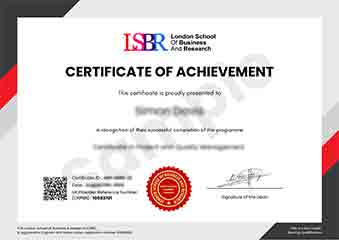Undergraduate Certificate in HVAC System Design for Reduced Carbon Footprint and Costs
Flexible Learning
24/7 Support
Enrol & Start Anytime
Recommended Learning Hours : 2-4 Hrs/Week
Course Fee
£99
Or Equivalent Local Currency
Undergraduate Certificate in HVAC System Design for Reduced Carbon Footprint and Costs
£99
• 2 MonthsAssessment Type
Quiz Based
Non Credit Bearing
Qualification
Duration
2 Months
Pedagogy
Online
Learning Style
Self Paced
Course Overview
Course Overview
This course is designed for undergraduate students, engineers, architects, and facilities managers seeking to develop skills in designing Heating, Ventilation, and Air Conditioning (HVAC) systems with reduced carbon footprint and costs. By enrolling in this certificate program, learners will gain hands-on experience with industry-standard design tools and software. They will learn to analyze and optimize HVAC systems for energy efficiency and sustainability.
Upon completing the course, students will be able to design and implement HVAC systems that minimize environmental impact while reducing energy costs. They will also develop skills in energy auditing, system simulation, and performance analysis.
Description
Unlock a Greener Future in HVAC
Join the shift towards sustainable building practices with our Undergraduate Certificate in HVAC System Design for Reduced Carbon Footprint and Costs. This comprehensive program equips you with the skills to design and optimize heating, ventilation, and air conditioning systems that minimize environmental impact while reducing energy costs.
Boost Your Career
Graduates can pursue exciting roles in sustainable building design, energy management, and HVAC consulting. Moreover, you'll gain a competitive edge in the job market as companies increasingly prioritize green technologies. Our certificate also prepares you for LEED accreditation and other industry certifications.
Hands-on Learning
Through interactive simulations, case studies, and real-world projects, you'll master the latest design software and techniques. Our expert instructors will guide you in applying theoretical concepts to practical problems, ensuring you're ready to make a positive impact in the industry.
Key Features
Quality Content
Our curriculum is developed in collaboration with industry leaders to ensure you gain practical, job-ready skills that are valued by employers worldwide.
Created by Expert Faculty
Our courses are designed and delivered by experienced faculty with real-world expertise, ensuring you receive the highest quality education and mentorship.
Flexible Learning
Enjoy the freedom to learn at your own pace, from anywhere in the world, with our flexible online learning platform designed for busy professionals.
Expert Support
Benefit from personalized support and guidance from our expert team, including academic assistance and career counseling to help you succeed.
Latest Curriculum
Stay ahead with a curriculum that is constantly updated to reflect the latest trends, technologies, and best practices in your field.
Career Advancement
Unlock new career opportunities and accelerate your professional growth with a qualification that is recognized and respected by employers globally.
Topics Covered
- Fundamentals of HVAC Systems: Understanding principles of heating, ventilation, and air conditioning systems.
- Energy Efficiency and Building Design: Exploring energy-efficient building design strategies and techniques.
- Cooling and Heating System Design: Designing and optimizing HVAC systems for reduced energy consumption.
- Air Distribution and Ventilation Systems: Designing and optimizing air distribution and ventilation systems for efficiency.
- Renewable Energy Systems Integration: Integrating renewable energy sources into HVAC system design.
- HVAC System Controls and Optimization: Optimizing HVAC system performance using advanced controls and technologies.
Key Facts
This certificate is designed for those who want to reduce carbon footprint and costs in HVAC systems.
Audience:
Building services engineers and technicians
Sustainability professionals and consultants
Architects and designers
Prerequisites:
Basic knowledge of HVAC systems
Completion of introductory engineering courses
Familiarity with building design principles
Outcomes:
Design energy-efficient HVAC systems
Analyze system performance and costs
Implement sustainable design solutions
Why This Course
Pursuing an Undergraduate Certificate in HVAC System Design can be a smart move. Notably, this program focuses on reduced carbon footprint and costs. Consider the following benefits:
Enhanced skills in designing energy-efficient systems, leading to improved employability.
Opportunity to learn from industry experts and stay updated on the latest technologies.
Chance to contribute to a sustainable future by reducing environmental impact through innovative HVAC designs.
Course Podcast
Listen to industry experts discuss key concepts and real-world applications of this course.
Course Brochure
Download the detailed course brochure to learn more about Undergraduate Certificate in HVAC System Design for Reduced Carbon Footprint and Costs
Download BrochurePay as an Employer
Request an invoice for your company to pay for this course. Perfect for corporate training and professional development.
Sample Certificate
Preview the certificate you'll receive upon successful completion of this program.

Flexible Learning
24/7 Support
Enrol & Start Anytime
Recommended Learning Hours : 2-4 Hrs/Week
100% Online
Corporate Invoicing Available
What People Say About Us
Hear from our students about their experience with the Undergraduate Certificate in HVAC System Design for Reduced Carbon Footprint and Costs at FlexiCourses.
Oliver Davies
United Kingdom"The course provided a comprehensive understanding of HVAC system design principles, allowing me to effectively balance energy efficiency and cost-effectiveness in my projects. I gained practical skills in designing and optimizing HVAC systems for reduced carbon footprint, which has significantly enhanced my career prospects in the field. The knowledge and skills I acquired have enabled me to take on more complex projects and contribute to the development of sustainable building designs."
Anna Schmidt
Germany"This course has been instrumental in equipping me with the skills and knowledge necessary to design and implement HVAC systems that not only reduce carbon footprint but also minimize costs for businesses and homeowners alike. The practical applications I've learned have significantly enhanced my career prospects, particularly in the area of sustainable building design, and I've already seen a notable increase in job offers and opportunities. Overall, the course has been a game-changer for my career in the HVAC industry."
Charlotte Williams
United Kingdom"The course structure was well-organized, allowing me to easily follow the progression from theoretical foundations to practical applications in HVAC system design. I found the comprehensive content to be highly beneficial in understanding the integration of sustainability and cost-effectiveness in building systems, which has significantly enhanced my professional growth in this field."
More Courses You Might Like
Explore similar courses to expand your learning journey
From Our Blog
Insights and stories from our business analytics community
"Revolutionizing Sustainability: Harnessing the Power of Undergraduate Certificate in HVAC System Design for a Greener Future"
Discover how an Undergraduate Certificate in HVAC System Design can revolutionize sustainability, slashing energy consumption and costs for a greener future.
HVAC System Design for Reduced Carbon Footprint and Costs Performance Optimization
Discover how to design and optimize HVAC systems for reduced carbon footprint and lower costs with our expert-led certificate program.
'Cooling the Planet, One System at a Time: Mastering the Undergraduate Certificate in HVAC System Design for a Sustainable Future'
Master sustainable HVAC system design with our Undergraduate Certificate program, equipping you with essential skills to reduce carbon footprint and costs for a greener future.

